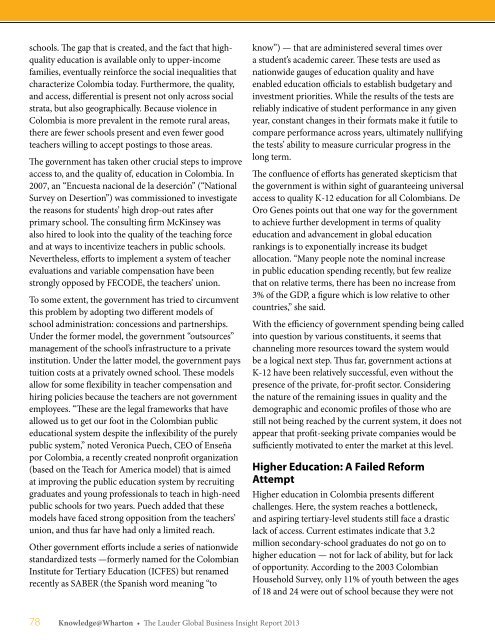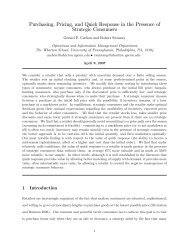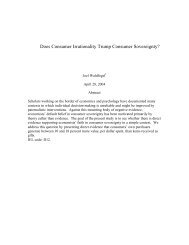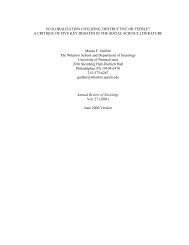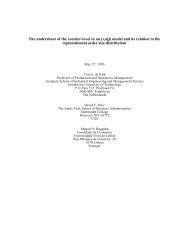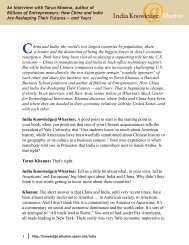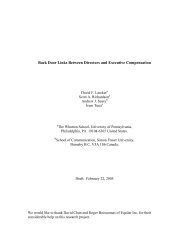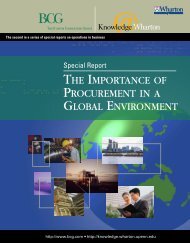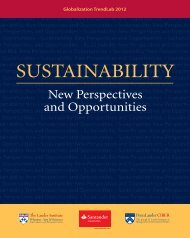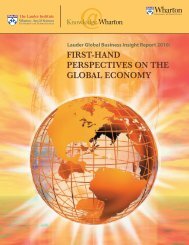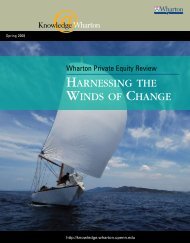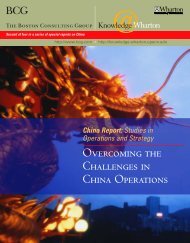building blocks for the Global economy - Knowledge@Wharton
building blocks for the Global economy - Knowledge@Wharton
building blocks for the Global economy - Knowledge@Wharton
Create successful ePaper yourself
Turn your PDF publications into a flip-book with our unique Google optimized e-Paper software.
schools. The gap that is created, and <strong>the</strong> fact that highquality<br />
education is available only to upper-income<br />
families, eventually rein<strong>for</strong>ce <strong>the</strong> social inequalities that<br />
characterize Colombia today. Fur<strong>the</strong>rmore, <strong>the</strong> quality,<br />
and access, differential is present not only across social<br />
strata, but also geographically. Because violence in<br />
Colombia is more prevalent in <strong>the</strong> remote rural areas,<br />
<strong>the</strong>re are fewer schools present and even fewer good<br />
teachers willing to accept postings to those areas.<br />
The government has taken o<strong>the</strong>r crucial steps to improve<br />
access to, and <strong>the</strong> quality of, education in Colombia. In<br />
2007, an “Encuesta nacional de la deserción” (“National<br />
Survey on Desertion”) was commissioned to investigate<br />
<strong>the</strong> reasons <strong>for</strong> students’ high drop-out rates after<br />
primary school. The consulting firm McKinsey was<br />
also hired to look into <strong>the</strong> quality of <strong>the</strong> teaching <strong>for</strong>ce<br />
and at ways to incentivize teachers in public schools.<br />
Never<strong>the</strong>less, ef<strong>for</strong>ts to implement a system of teacher<br />
evaluations and variable compensation have been<br />
strongly opposed by FECODE, <strong>the</strong> teachers’ union.<br />
To some extent, <strong>the</strong> government has tried to circumvent<br />
this problem by adopting two different models of<br />
school administration: concessions and partnerships.<br />
Under <strong>the</strong> <strong>for</strong>mer model, <strong>the</strong> government “outsources”<br />
management of <strong>the</strong> school’s infrastructure to a private<br />
institution. Under <strong>the</strong> latter model, <strong>the</strong> government pays<br />
tuition costs at a privately owned school. These models<br />
allow <strong>for</strong> some flexibility in teacher compensation and<br />
hiring policies because <strong>the</strong> teachers are not government<br />
employees. “These are <strong>the</strong> legal frameworks that have<br />
allowed us to get our foot in <strong>the</strong> Colombian public<br />
educational system despite <strong>the</strong> inflexibility of <strong>the</strong> purely<br />
public system,” noted Veronica Puech, CEO of Enseña<br />
por Colombia, a recently created nonprofit organization<br />
(based on <strong>the</strong> Teach <strong>for</strong> America model) that is aimed<br />
at improving <strong>the</strong> public education system by recruiting<br />
graduates and young professionals to teach in high-need<br />
public schools <strong>for</strong> two years. Puech added that <strong>the</strong>se<br />
models have faced strong opposition from <strong>the</strong> teachers’<br />
union, and thus far have had only a limited reach.<br />
O<strong>the</strong>r government ef<strong>for</strong>ts include a series of nationwide<br />
standardized tests —<strong>for</strong>merly named <strong>for</strong> <strong>the</strong> Colombian<br />
Institute <strong>for</strong> Tertiary Education (ICFES) but renamed<br />
recently as SABER (<strong>the</strong> Spanish word meaning “to<br />
78 <strong>Knowledge@Wharton</strong> • The Lauder <strong>Global</strong> Business Insight Report 2013<br />
know”) — that are administered several times over<br />
a student’s academic career. These tests are used as<br />
nationwide gauges of education quality and have<br />
enabled education officials to establish budgetary and<br />
investment priorities. While <strong>the</strong> results of <strong>the</strong> tests are<br />
reliably indicative of student per<strong>for</strong>mance in any given<br />
year, constant changes in <strong>the</strong>ir <strong>for</strong>mats make it futile to<br />
compare per<strong>for</strong>mance across years, ultimately nullifying<br />
<strong>the</strong> tests’ ability to measure curricular progress in <strong>the</strong><br />
long term.<br />
The confluence of ef<strong>for</strong>ts has generated skepticism that<br />
<strong>the</strong> government is within sight of guaranteeing universal<br />
access to quality K-12 education <strong>for</strong> all Colombians. De<br />
Oro Genes points out that one way <strong>for</strong> <strong>the</strong> government<br />
to achieve fur<strong>the</strong>r development in terms of quality<br />
education and advancement in global education<br />
rankings is to exponentially increase its budget<br />
allocation. “Many people note <strong>the</strong> nominal increase<br />
in public education spending recently, but few realize<br />
that on relative terms, <strong>the</strong>re has been no increase from<br />
3% of <strong>the</strong> GDP, a figure which is low relative to o<strong>the</strong>r<br />
countries,” she said.<br />
With <strong>the</strong> efficiency of government spending being called<br />
into question by various constituents, it seems that<br />
channeling more resources toward <strong>the</strong> system would<br />
be a logical next step. Thus far, government actions at<br />
K-12 have been relatively successful, even without <strong>the</strong><br />
presence of <strong>the</strong> private, <strong>for</strong>-profit sector. Considering<br />
<strong>the</strong> nature of <strong>the</strong> remaining issues in quality and <strong>the</strong><br />
demographic and economic profiles of those who are<br />
still not being reached by <strong>the</strong> current system, it does not<br />
appear that profit-seeking private companies would be<br />
sufficiently motivated to enter <strong>the</strong> market at this level.<br />
Higher Education: A Failed Re<strong>for</strong>m<br />
Attempt<br />
Higher education in Colombia presents different<br />
challenges. Here, <strong>the</strong> system reaches a bottleneck,<br />
and aspiring tertiary-level students still face a drastic<br />
lack of access. Current estimates indicate that 3.2<br />
million secondary-school graduates do not go on to<br />
higher education — not <strong>for</strong> lack of ability, but <strong>for</strong> lack<br />
of opportunity. According to <strong>the</strong> 2003 Colombian<br />
Household Survey, only 11% of youth between <strong>the</strong> ages<br />
of 18 and 24 were out of school because <strong>the</strong>y were not


